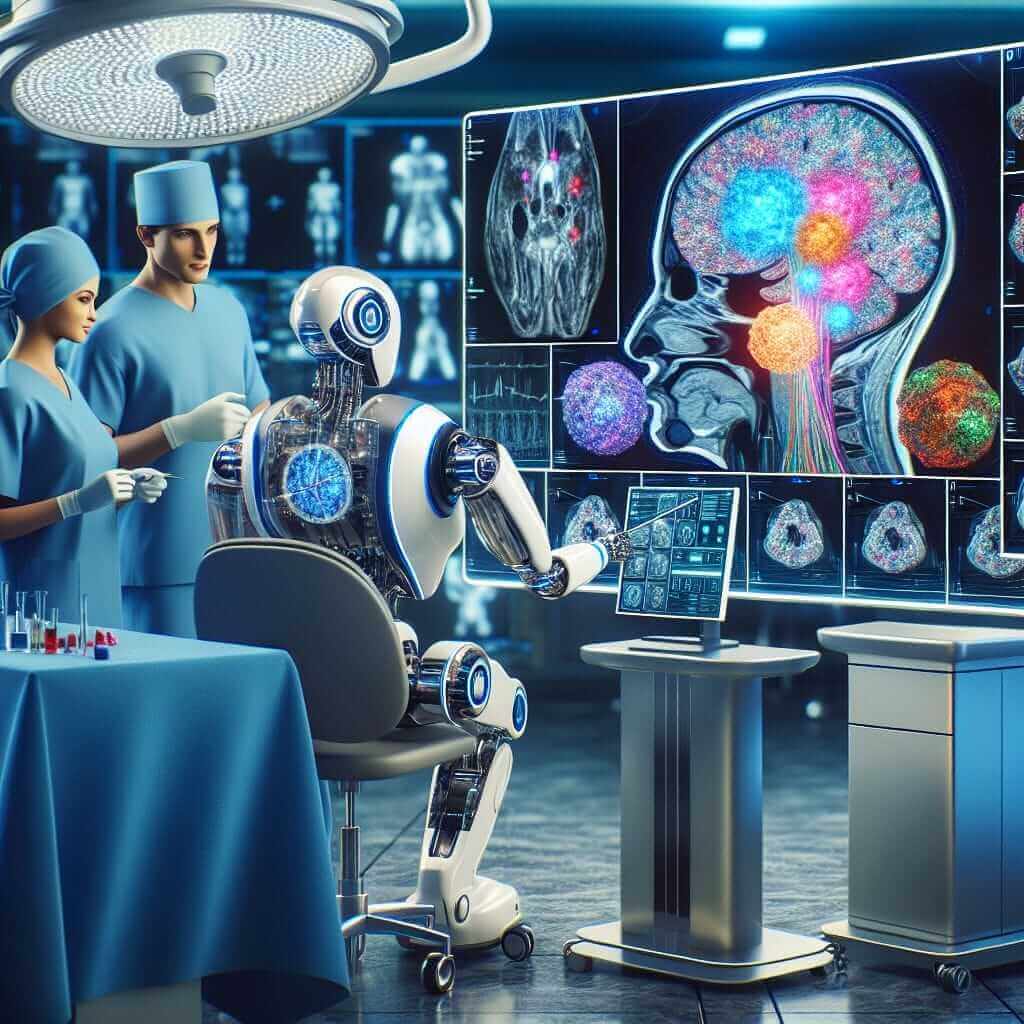The IELTS Reading section is known for its challenging passages and varied question types. Topics frequently appear that are both contemporary and globally significant. One such topic is the impact of artificial intelligence on healthcare. Given the rapid advancements and the pressing need for efficient healthcare, it’s no surprise that this subject matter appears quite often in the reading passages of IELTS exams. By understanding and practicing this theme, you can better prepare for potential future questions.
Complete Reading Passage: Impacts of Artificial Intelligence on Healthcare
Reading Passage
The application of artificial intelligence (AI) in healthcare has been revolutionary, significantly impacting various aspects of medical practice and patient care. AI technologies assist in diagnosing diseases, personalizing treatment plans, predicting patient outcomes, and streamlining administrative processes.
Diagnosis and Treatment
Artificial intelligence, especially through machine learning algorithms, has enhanced diagnostic accuracy by analyzing vast amounts of medical data quickly. For instance, AI can interpret radiology images to detect anomalies faster and often more accurately than human radiologists. This rapid and precise diagnosis allows for earlier intervention and has been critically acclaimed in fields such as oncology, where early detection can save lives.

Personalized Medicine
Personalized medicine is another area where AI is making substantial strides. By analyzing genetic information and patient history, AI can suggest individualized treatment plans, optimizing therapeutic outcomes and minimizing adverse effects. This tailored approach to treatment is particularly beneficial in managing chronic diseases like diabetes and cancer, where patient response to treatment can vary widely.
Predictive Analytics
AI’s predictive analytics capabilities can forecast patient outcomes by processing historical health data and identifying patterns. This has proven useful in preventive care, as early predictions can guide preemptive measures, potentially reducing hospital admissions and improving patient quality of life.
Operational Efficiencies
Streamlining administrative tasks through AI has also transformed healthcare operations. AI-driven systems can manage appointments, billing, and patient records more efficiently, reducing the burden on healthcare providers and minimizing errors. For example, natural language processing (NLP) tools can extract and organize data from electronic health records (EHRs), making information more accessible and usable.
Questions
1. Multiple Choice:
- According to the passage, which area benefits the most from AI in terms of early disease detection?
a. Cardiovascular diseases
b. Oncology
c. Dermatology
d. Neurology
2. Identifying Information: True, False, Not Given
2. AI has completely replaced the need for human radiologists.
3. Personalized medicine helps in creating treatment plans based on patient history and genetics.
3. Matching Headings
3. Match the following headings to the paragraphs:
- Diagnosis and Treatment
- Personalized Medicine
- Predictive Analytics
- Operational Efficiencies
4. Summary Completion
4. Complete the summary using the words from the passage:
AI technologies enhance the 1 of medical diagnoses by processing large amounts of data swiftly. In the field of 2, early detection through AI can save lives. Moreover, personalized medicine benefits from AI’s ability to analyze 3 and patient history to optimize treatment plans. Predictive analytics in healthcare facilitates preventive care by forecasting 4 outcomes, thereby improving patient quality of life. Finally, AI contributes to operational efficiencies by managing 5 tasks and minimizing errors in healthcare operations.
Answers and Explanation
Answer Key:
- b. Oncology
- False
- True
-
- Diagnosis and Treatment
- Personalized Medicine
- Predictive Analytics
- Operational Efficiencies
-
- accuracy
- oncology
- genetics
- patient
- administrative
Explanation:
- Oncology benefits greatly from early detection using AI because it can lead to lifesaving interventions.
- The passage mentions that AI assists human radiologists but does not replace them.
- Personalized medicine includes analyzing genetic information and patient history to tailor treatments.
- Summary completion pulls directly from key ideas in the passage, focusing on the main impacts of AI on healthcare.
Common Mistakes
Common mistakes when tackling such reading passages include misunderstanding the context of technical terms, overlooking specific details, and failing to connect the main ideas. Practice by focusing on identifying keyword synonyms and understanding the broader context can help mitigate these errors.
Vocabulary List
- Anomalies (n): /əˈnɒməliz/ – deviations from the norm or standard.
- Intervention (n): /ˌɪntəˈvɛnʃən/ – the act of becoming involved in a difficult situation to change the outcome.
- Therapeutic (adj): /ˌθɛrəˈpuːtɪk/ – relating to the healing of a disease.
- Predictive (adj): /prɪˈdɪktɪv/ – having the quality of predicting future events or outcomes.
- Streamline (v): /ˈstriːmlaɪn/ – make a process more efficient and effective.
Grammar Focus
-
Passive Voice:
- AI has been critically acclaimed (present perfect passive) in fields such as oncology.
- This has proven useful (present perfect passive) in preventive care.
-
Relative Clauses:
- AI technologies, which assist in diagnosing diseases, have been revolutionary.
- This approach, where patient response to treatment can vary, is particularly beneficial.
Tips for High Reading Scores
- Identify Keywords: Focus on finding and understanding keywords and their synonyms in both the questions and passage.
- Skim for Structure: Skim the passage first to understand its structure and where information is likely located.
- Practice with Variety: Expose yourself to different topics and question types frequently appearing in IELTS.
- Time Management: Practice under timed conditions to enhance your ability to manage time during the actual exam.
By honing your skills on thematic passages like the impacts of artificial intelligence on healthcare, you can improve both your reading comprehension and test-taking strategies for the IELTS Reading section.